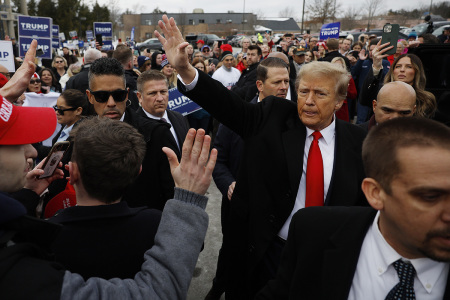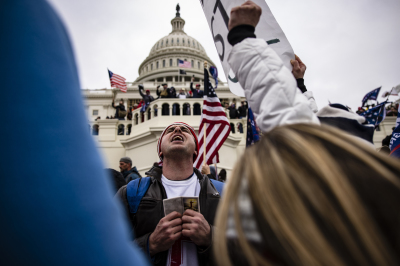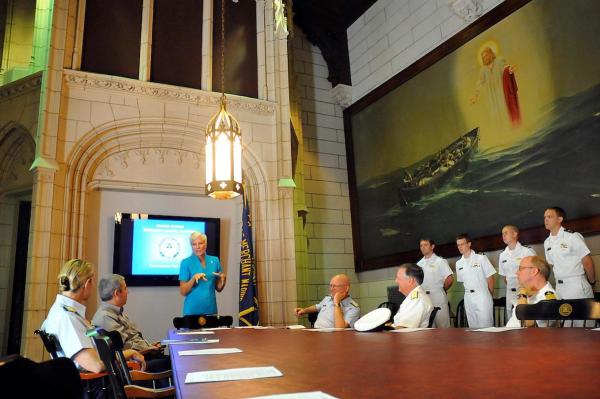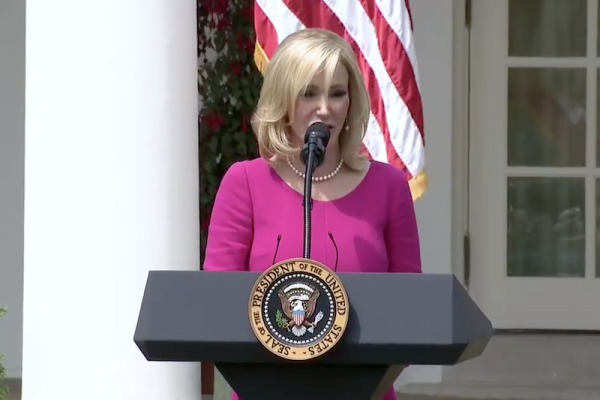Supreme Court weighs if Colorado can ban Trump from 2024 ballot

The U.S. Supreme Court heard oral arguments on Thursday surrounding the question of whether former President Donald Trump can be legitimately removed from Colorado's election ballot.
The case of Donald Trump v. Norma Anderson et al. centers on whether Colorado has the right to ban Trump from the 2024 ballot based on his alleged involvement in the Jan. 6, 2021, U.S. Capitol riot, even though he has not been convicted in court.
In December, the Colorado Supreme Court cited Section 3 of the 14th Amendment of the U.S. Constitution, which prohibits individuals from holding office who had sworn an oath to defend the Constitution who had "engaged in insurrection or rebellion against the same, or given aid or comfort to the enemies thereof."
Former Texas Solicitor General Jonathan Mitchell argued the case for Trump, telling the justices in his opening remarks that the 14th Amendment doesn't apply to Trump because he was "not an officer of the United States as that term is used throughout the Constitution."
"'Officer of the United States' refers only to appointed officials, and it does not encompass elected individuals, such as the president or members of Congress," argued Mitchell.
"Section 3 cannot be used to exclude a presidential candidate from the ballot even if that candidate is disqualified from serving as president under Section 3, because Congress can lift that disability after the candidate is elected, but before he takes office."

Mitchell cited as authoritative an 1860s case surrounding Caesar Griffin, a man who argued that his murder conviction should be tossed because the judge who oversaw his case was a Confederate who had previously made an oath to support the Constitution as a Virginia state legislator.
Chief Justice Salmon P. Chase ruled that "legislation by Congress is necessary" for the judge to be disqualified under the 14th Amendment, thus preventing the decision from being overturned.
Justice Sonia Sotomayor was critical of Mitchell's argument that there is a difference between an officer and the office of president, saying that it was "a bit of a gerrymandered rule, isn't it? Designed to benefit your client."
Justice Elena Kagan questioned how the reasoning of the amendment could be "that an insurrectionist cannot hold the whole panoply of offices in the United States, but we're perfectly fine with that insurrectionist being president?"
Mitchell refused to label the Jan. 6 Capitol Riot an "insurrection," saying that while the events were "shameful, criminal, violent," they "did not qualify as insurrection, as that term is used in Section 3."
Jason Murray argued on behalf of the Colorado voters wanting Trump removed from the ballot that Trump's actions on Jan. 6, 2021, fit the definition of an insurrection and thus barred him from holding office.
"By engaging in insurrection against the Constitution, President Trump disqualified himself from public office," said Murray. "Section 3 uses deliberately broad language to cover all positions of federal power requiring an oath to the Constitution."
Regarding the attempted distinction between "office under" and "officer of," Murray said the "two phrases are two sides of the same coin, referring to any federal office or to anyone who holds one."
"Under Article 2 and the 10th Amendment, states have the power to ensure that their citizen's electoral votes are not wasted on a candidate who is constitutionally barred from holding office," he continued.
During Murray's arguments, Chief Justice John Roberts and Kagan questioned whether states had the power to enforce the 14th Amendment and if this would interfere with the wishes of other states.
Roberts asked Murray about what would hypothetically stop more conservative states from disqualifying President Joe Biden based on their own interpretations of what constituted insurrection.
"There's a reason [that] has been dormant for 150 years, and it's because we haven't seen anything like Jan. 6 since Reconstruction," Murray replied. "Insurrection against the Constitution is something extraordinary."
"It really requires a concerted group effort to resist through violence, not some ordinary application of state or federal law, but the functions mandated by the Constitution itself."
Colorado Solicitor General Shannon Stevenson represented the state government, arguing that the state was within its rights to exercise authority over whether Trump could be on the ballot.
When Justice Samuel Alito asked Stevenson about the possibility of other states removing candidates their leaders do not like from the ballot, she replied that "we have to have faith in our system."
"That people will follow their election processes appropriately, that they will take realistic views of what insurrection is under the 14th Amendment," Stevenson added. "I don't think that this court should take those threats too seriously."
In December, the Colorado Supreme Court ruled 4-3 that Trump cannot be placed on the ballot for the 2024 presidential election, citing his alleged incitement of the Capitol riot.
"We do not reach these conclusions lightly. We are mindful of the magnitude and weight of the questions now before us," the per curiam opinion read.
"We are likewise mindful of our solemn duty to apply the law, without fear or favor, and without being swayed by public reaction to the decisions that the law mandates we reach."
Colorado Chief Justice Brian Boatwright authored a dissent, arguing in part that the court went beyond its scope when it concluded that Trump had engaged in insurrection.
"Unlike qualifications such as age and place of birth, an application of Section Three requires courts to define complex terms, determine legislative intent from over 150 years ago, and make factual findings foreign to our election code," wrote Boatwright.
"Dismissal is particularly appropriate here because the Electors brought their challenge without a determination from a proceeding (e.g., a prosecution for an insurrection-related offense) with more rigorous procedures to ensure adequate due process."
Trump appealed the decision. Last month, the U.S. Supreme Court issued a miscellaneous order agreeing to hear oral arguments in the litigation.
Trump has had a strong showing in the Republican primary season thus far, winning the Iowa caucus and the New Hampshire primary. Many of his Republican challengers have suspended their campaigns and endorsed him.






















